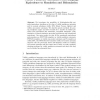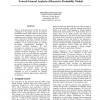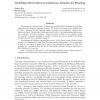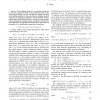165 search results - page 30 / 33 » Exotic Quantifiers, Complexity Classes, and Complete Problem... |
IPPS
1999
IEEE
13 years 11 months ago
1999
IEEE
Parallel and distributed systems are representative of large and complex systems that require the application of formal methods. These systems are often unreliable because implemen...
CSL
2006
Springer
13 years 11 months ago
2006
Springer
Abstract. We investigate the possibility of (bi)simulation-like preorder/equivalence checking on the class of visibly pushdown automata and its natural subclasses visibly BPA (Basi...
UAI
2001
13 years 8 months ago
2001
There is increasing interest within the research community in the design and use of recursive probability models. There remains concern about computational complexity costs and th...
JAIR
2006
13 years 7 months ago
2006
In this paper we present pddl+, a planning domain description language for modelling mixed discrete-continuous planning domains. We describe the syntax and modelling style of pddl...
CDC
2009
IEEE
14 years 3 days ago
2009
IEEE
— The nullspace method is a powerful framework to solve the synthesis problem of fault detection filters in the most general setting. It is also well suited to address the least...




